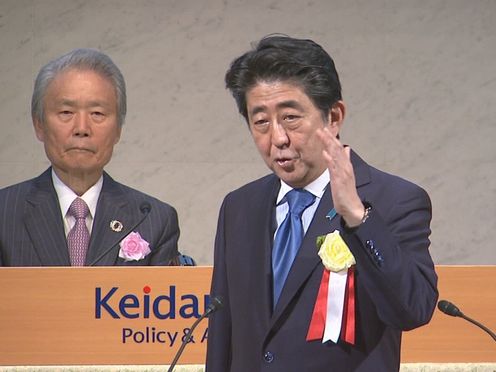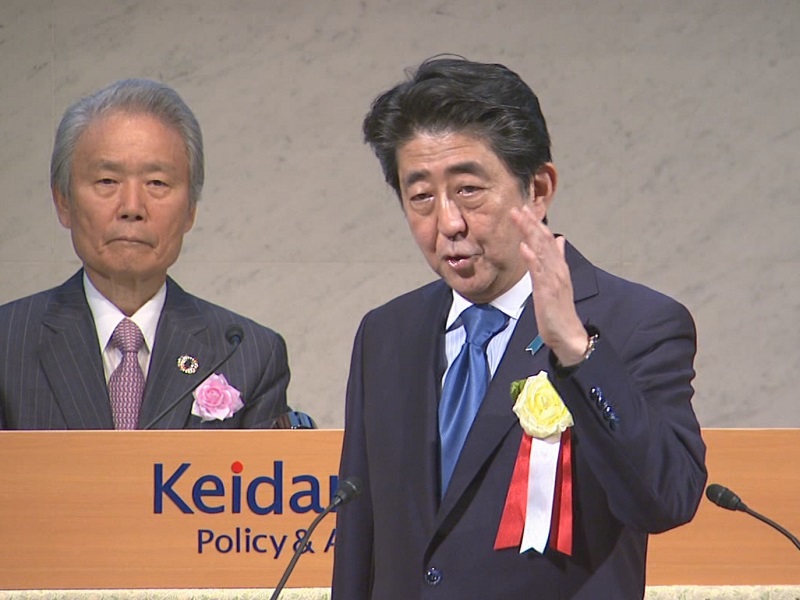Home > News > The Prime Minister in Action > June 2018 > Annual General Assembly of Keidanren (Japan Business Federation)
The Prime Minister in Action
Annual General Assembly of Keidanren (Japan Business Federation)
May 31, 2018
[Provisional Translation]
On May 31, 2018, Prime Minister Shinzo Abe attended the Annual General Assembly of Keidanren (Japan Business Federation) held in Tokyo.
In his address, the Prime Minister said,
“Thank you very much for inviting me here today.
First, Chairman Sakakibara, thank you so much for your hard work and your services. I am honored to have an opportunity to work together closely with you and promote Abenomics. Taking this opportunity, I would like to express my deep gratitude for your cooperation.
Over these past four years, we have significantly advanced corporate governance reforms. Nowadays, it is the standard for publicly listed companies to appoint at least two external board directors. Agriculture, medicine, and energy; we have also challenged bedrock regulations like these one after another in various fields. Japan is currently exerting tremendous leadership to extend economic zones across the world based on free and fair rules such as the Trans-Pacific Partnership (TPP), and an economic partnership agreement (EPA) with Europe.
We have also brought the corporate tax rate down to the 20% range. There are few Keidanren Chairpersons who have achieved that range of significant corporate tax rate reduction. I hope you will all join me in expressing our respect for Chairman Sakakibara’s leadership with a round of applause.
Having said that, I don’t believe he did all this work with a narrow view of just focusing on increasing the profits of Keidanren member companies. Am I right, Chairman?
First and foremost, we are determined to get rid of the deflationary mindset that has seeped in across this country due to the deflation for almost 20 years. We aim to increase global competitiveness through bold challenges, and incorporate growth around the world into the economic growth of Japan. By doing so, we will strongly revitalize the Japanese economy by creating a virtuous economic cycle. With this determination, the Government has been strongly releasing sets of the three arrows, working together with the business community. That is why I have asked Chairman Sakakibara to increase wages, feel terribly sorry for bothering him, each time I visit this Kaikan building.
The members of Keidanren have kindly taken to heart this determination. During Chairman Sakakibara’s tenure, simply adding up the values of wage increases reported in the series of Keidanren’s studies, the monthly income has increased by over 31,000 yen over these past four years. Few Keidanren Chairmen in recent years have achieved this kind of wage increase. In particular, this year, I have requested a wage increase of 3% or more. It is rather a high hurdle as a goal. That said, according to the survey on major companies recently conducted by Keidanren, amazingly, 76% of them have increased wages on an annual salary basis by 3% or more. I would like to take this opportunity to express my gratitude for your efforts.
Incoming Chairman Nakanishi, I am not saying all of this to put pressure on you. We are facing a crucial moment for the exit from deflation, something that has been our ardent wish for many years. Under the new leadership of Mr. Nakanishi, I hope to further accelerate Abenomics, with the continued cooperation of Keidanren and everyone else gathering here.
Over these past five years, employment has increased by 2.5 million people. The number of people in regular employment has increased by 780,000. We have also recovered the 500,000 jobs lost when the Democratic Party of Japan was in power. This spring, the employment rate for new university graduates is estimated to reach 98%. That is the highest result ever for that figure.
Meanwhile, personnel shortages are becoming a serious problem all across the country. Challenging times create opportunities. Artificial intelligence, robots, the Internet of Things (IoT). We must maintain the strong will to continue to pursue productivity revolutions by making use of these latest innovations. We will take up the challenge of boldly reforming socioeconomic systems in order to materialize Society 5.0 ahead of the rest of the world. That is the goal of the new Growth Strategy, which we are to compile very soon.
Various institutions and systems are struggling to keep pace with the rapid speed of technological innovation. Overcoming this governance gap was a major topic of discussion at this year’s World Economic Forum in Davos and the Abe Cabinet will take up this challenge. In the current session of the Diet, we recently passed a bill to establish a regulatory sandbox system. We will move quickly to put this system into operation next month. I hope that you can all utilize this new scheme to take up new challenges in revolutionary business fields, including FinTech.
In 2020, from Haneda Airport to Odaiba, autonomous vehicles will escort visitors from around the world. If people have a smartphone, they will be able to make cashless purchases. This is the kind of society we aim to achieve in two years’ time and the Government will also take up the challenge of implementing bold structural reforms to this end.
We must also reform the current approach to human resource development and education. A survey by the Ministry of Economy, Trade and Industry projects a shortfall of nearly 800,000 information technology (IT) personnel by 2030. Literacy in information technology or information processing, such as artificial intelligence and big data, is already the modern-day equivalent of reading, writing and arithmetic.
From FY2020, computer coding education will start in elementary schools. We will encourage learning of science and mathematics regardless of whether students wish to specialize in liberal arts, humanities and social sciences or math, sciences and engineering. For university entrance exams as well, we are also looking to add informatics as a mandatory subject much like Japanese, mathematics and English. In addition, we will continue to advance reform towards the transition to a new education system that is better suited in the era of Society 5.0, including creating new degree programs that transcend silos among departments such as the department of science and the department of engineering, in order to develop advanced AI and IT personnel.
The reform of universities, which are the centers for creating innovation, is an issue that can wait no longer.
We will review the management subsidies scheme for universities. We will reform the allocation method for subsidies to incentivize universities to make efforts to engage in management reforms and make active attempts to procure private sector funds. We will also expand the annual salary system for researchers and thoroughly implement measures to ensure that salary levels are determined based on performance evaluation. In addition, by enhancing research grants for young researchers, we aim to further increase opportunities for such young researchers to play active roles.
We will make Japan the country that is best suited for innovation in the world. The Government will compile an integrated innovation strategy next month, looking to the future and with a view to creating an innovation ecosystem in that end.
A short while ago, the House of Representatives passed the work style reform bill in the plenary session. Based on the agreement of both the business community and the labor community, we will introduce regulations that set maximum limits on long working hours for the first time. We will realize equal pay for equal work. These are the most historic, wide-ranging reforms in the 70 years since the enactment of the Labor Standards Law. The time is now for us to create a society in which diverse working styles are possible, responding to people’s individual circumstances, including childcare and nursing care. With this strong conviction, I am determined to realize work style reform during the current session of the Diet.
We will also bring forward to the greatest extent possible the revolution in human resource development, for which we have received the cooperation of the business community. To coincide with the increase in the consumption tax rate in October next year, we will realize in one fell swoop the provision of early childhood education for free, for children between the ages of three and five. We will make tuition fees free at universities and other higher education institutions for those children who are truly in need, creating a society in which everyone can go to a specialized vocational college or university if they have the ambition to do so, no matter how difficult their family financial circumstances are.
With an eye firmly on the future we will implement a major shift towards a social security system oriented to all generations. Abenomics is now closing in on those fundamental reforms. We will take up the challenge of major reforms to the socioeconomic system in a 100-year life society.
Incoming Chairman Nakanishi and members of Keidanren, we have much work to do. A piecemeal approach is insufficient. We must do everything we can. People often ask whether this is really possible. Even thinking whether it is really possible creates a barrier to achieving it.
Before the inauguration of the Abe Cabinet, it used to be said that the number of foreign visitors to Japan would be unlikely to ever exceed 10 million visitors a year. It was thought that visitor numbers would peak at 7 or 8 million a year and fall off thereafter. At the time the Abe Cabinet set a target of achieving 20 million visitors a year, which many criticized as reckless. Criticism alone creates nothing. Visitor numbers are now increasing towards the 30 million mark. In addition, exports of agricultural products have smashed records every year for five consecutive years and now exceed 800 billion yen, meaning that our target of 1 trillion yen in agricultural exports is now in reach. The number of new farmers under 40 years of age has also risen to above 20,000 and has continued to increase, reaching truly historic highs. Agriculture is undergoing major changes and young people are looking to devote their lives and careers to this sector. Now, they have started to recognize that agriculture is an area in which they can find new ways to put their knowledge to work.
Shohei Otani, a baseball player, has continued to perform outstandingly, demonstrating his two-way skills brilliantly, even after transferring to the Major League in the U.S. If you try, it is possible to achieve anything. It was said that a two-way role in the Major League would be impossible, but nonetheless Otani is now looking to grasp the record of Babe Ruth. It is really a question of will. If you have the will and the determination you can surmount any barrier. The Abe Cabinet remains determined to continue to prioritize economic measures, with the cooperation of the members of Keidanren.
I would like to close by reiterating my deepest appreciation to Chairman Mr. Sakakibara and requesting the continued cooperation of Incoming Chairman Nakanishi. I would also like to wish all of you in attendance today even further success in your endeavors. Thank you for your kind attention.


